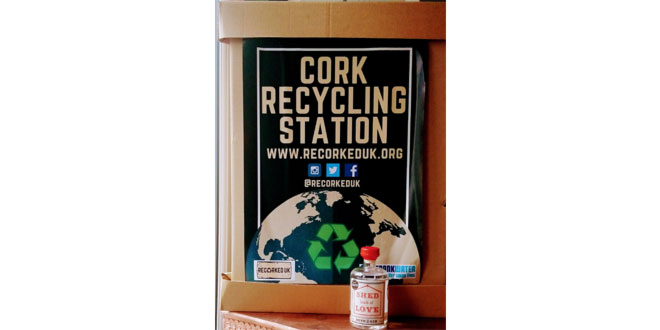
Climate change is an issue all businesses can do something about by taking action to reduce their carbon emissions. Recycling is one of the easy steps every business can take to help.
Last year the UK Government laid out plans for a green industrial revolution. The aim is to build a greener Britain by cutting carbon emissions, paving the way for the global Race to Net Zero. This year the UK will host the G7 Summit and the UN Climate Change Conference, COP26, in Glasgow, to build world-wide cooperation to tackle climate change.
The Department for Business, Energy and Industrial Strategy is encouraging small businesses across the country to join the fight against climate change by going green, putting recycling at the heart of the business, as one of the steps they can take to play their part.
This Global Recycling Day, an initiative from the Global Recycling Foundation, three small businesses share how they have taken responsibility for their own recycling habits, and how through new and simple initiatives they are working towards a more sustainable future for our planet.
Encouraging customers to send back their old swimwear for recycling is key to building a cleaner, greener business for Natalie Glaze and Zanna Van Dijk, co-founders of fashion brand Stay Wild.
“This year we have launched our new circularity project, to take back people’s old swimwear they no longer wear from any brand and recycle and repurpose them to keep clothes out of landfill.
“We take pre-orders to minimise any wastage, utilise deadstock in our collection, make high quality pieces that last longer to encourage buying less, but better. We produce our items at a small zero waste factory in London and upcycle material heading to landfill into t-shirts”.
Stay Wild launched in 2019, using sustainable materials and local production, and has a small team of ten staff. Zanna says there are simple steps every business can take to make sure recycling is front of mind.
“This is a crucial time in our global fight against climate change. A great place to start is packaging. Reduce the need for new materials and switch to reusable, recyclable or compostable options. All our hang tags and packaging are recycled and recyclable, our hygiene liners are compostable, and even the stitching on our swimwear is made from recycled plastic bottles.
“We hope to pave the way for more brands to do the same and hope that our approach will inspire others to think in a more sustainable way.”
Former BBC Apprentice star Susie Ma created Tropic to be a force for good beyond beauty. She believes that all businesses have a responsibility to the planet and to protect the natural world.
“No company is perfect, but we believe in progression and ensuring that we are doing everything we can to meet the highest standards possible. We hope to inspire and drive change through example.
“We’ve been landfill free for two years and in 2020, we recycled 122 tonnes which equated to 65% of all our waste. Anything we can’t recycle is repurposed into an alternative fuel (that replaces fossil fuels) to power homes and businesses. All the energy used to recycle and turn our waste into alternative fuel is, like all aspects of our operations, double carbon offset.”
Susie explains how they have created a fully recyclable product.
“Our Colour Palette was created to bring a sustainable solution to the beauty industry that would generate far less landfill waste. The palette can be refilled by simply replacing the product pans once empty. The product pans are made of aluminium, which is infinitely recyclable. The process of recycling aluminium saves around 95% of the energy needed to make the metal new from raw materials, and it can be repeated infinitely without any loss of quality. To date, the Colour Palette has stopped over 10 tonnes of plastic waste from being generated, compared to our previous makeup range.”
Husband and wife Andrew and Zoe Arnold-Bennett explain why recycling is at the core of their innovative small batch gin business.
Zoe, of Cumbria-based Shed 1 Gin, says: “From the beginning it was important to us to be as sustainable as we possibly could be. When we first designed our packaging, we made sure to pick material which is recycled, recyclable, reusable, or compostable.
“We invested in a cardboard shredder, which shreds cardboard into nets which we then wrap our bottles in. The cardboard comes in from goods ordered, and we reuse it by shredding it and using it to package the goods we send out. When needed we supplement with green, compostable bubble wrap which, if it ends up in landfill, degrades and adds nutrients to the soil. Our corks are also recyclable as are our paper labels.”
The duo also encourage their customers to be sustainable.
Andrew adds: “It is important that recycling doesn’t just stop with us. We encourage our customers to bring in their old corks, and we send them off to be recycled. We also offer a refill service for those living locally, as well as a bottle return initiative. For every bottle returned to us we donate to our Marmalade Fund.”
Shed 1 Gin know that recycling isn’t just about the packaging.
“Beyond packing we also looked at making sure we were putting the planet first during production. We use a closed cooling system, which means we can recycle the cooling water used in the distilling process, minimising water loss – saving thousands of litres of water every year.”
All businesses can start making small changes now to reduce their carbon footprint by recycling to help meet the UK’s target of becoming Net-Zero by 2050.
Find out how to green your business at the Race to Zero SME Climate Hub website and pledge to Net-Zero targets.